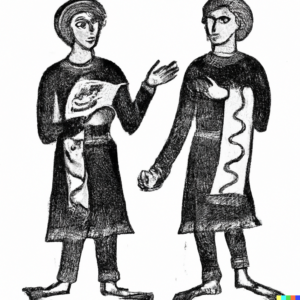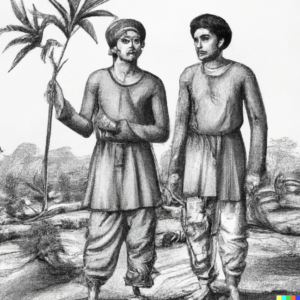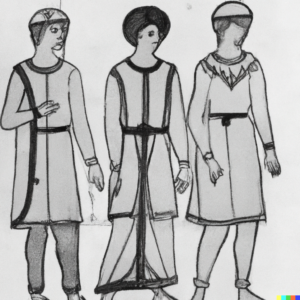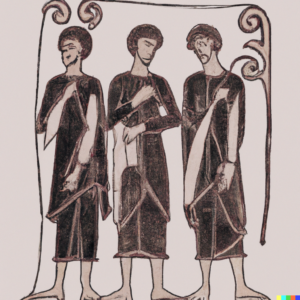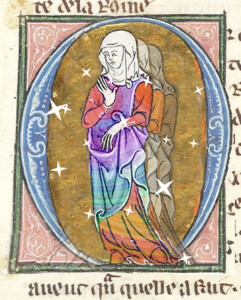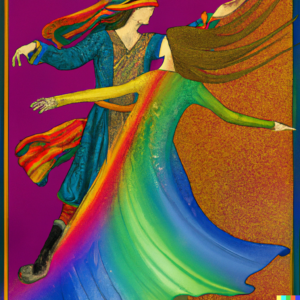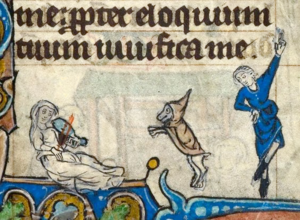First of all, it happened in another universe, and on the outer fringes of another galaxy, and on another planet, and in another time zone. You could hardly expect those people to be the same as the people you know.
On this planet, people were chosen as rulers because they were models of civic virtue. You could not be a ruler if you did not have the imagination to see where wickedness led and what the fruits of meanness and thoughtlessness were. But you could also not be a ruler if you had an especially sharp wit, as it was believed that you must one day inevitably cut someone with it. So malicious people, the kind who put a time-delay fuse into seemingly innocuous remarks, were sorted out and prevented from ruling.
This led to a certain amount of delay, from time to time, in filling positions of authority. In the Kingdom of Niffum, for example, there were two candidates for the position of King, Brizent and Brumm, and the people had reservations about both of them. Not personal reservations, of course. Brizent was a wonderful young man. The tiniest lie, even in the service of diplomacy, gave him the most intense pain. Even as a child he was like a considerate puppy—a puppy that loves you on sight but is too thoughtful to lick your face without requesting the honor of doing so. When you looked into his eyes, it was like looking into a pool of warm honey; there was depth, and warmth, and a wonderful sweetness that somehow stopped just this side of treacle. Men and women alike fell under his spell. His eyes declared, You I like. And if they said this to everyone, you still felt especially privileged when they said it to you. His eyes said this, firmly and without equivocation, even to the Warmaster Belzun, the wizard who was in charge of national defense, a dreadful gossip known for his uncanny ability to intuit even the tiniest little pocket of evil in even the kindest person and then spread the word with a touching devotion to his calling. Belzun was not a common gossip: he was a true professional, with high standards, willing to put in the time and effort to master all the details of sleaze. He was proud that he always had the straight poop—so straight and taut that you could snap it like a chalk line.
And people who worried about Brizent spoke of this. “After all,” they said, “you can’t like everyone. Doesn’t it bespeak a lack of imagination for Brizent to think highly of the Warmaster?”
“But note,” others said, “that the Warmaster doesn’t have anything good at all to say about Brizent. That is certainly a glowing recommendation.”
“Too glowing,” said someone else. “When someone gives that high a recommendation, it makes you wonder just what he has in mind.”
“But we just agreed that Belzun says nothing good at all about Brizent,” said someone else.
“That’s exactly the point.”
“I don’t understand at all.”
“I’m so glad to see that we’ve reached agreement on at least one issue.”
“You’ll never be king.”
Brumm, on the other hand—Brumm was a wonderful person as well. He had a disposition as bright as the gleam of the sun in the eye of a dewdrop. On cold, dreary mornings, when clots of thick fog huddled together for comfort, people came to be near him and bask in the warmth of his smile. He was bright and clever—
“He’s bright and clever,” someone said. “At least Brizent isn’t clever.”
“But Brizent lacks imagination.”
“If we wanted imagination, we would ask the Warmaster Belzun to be king. I have been present when his imagination stretched to the far end of the universe, and returned thence only for lack of further things to imagine.”
“Ha!” said someone else. “The people of the Legab take the end of the universe for their starting point when they imagine.”
Several people scowled. The Legab were their traditional enemies. They were dreadful people, untrustworthy and vile. Much of what they spent their time thinking about didn’t even exist. Even now the two countries were engaged in a major war, the result of a dispute over the location of a bakery. Because of the bakery, and because of the oft-noted circumstance that Legab spelled “Bagel” backwards—a source of cruel jokes at the expense of the Legab—the war had been dubbed “the Bagel War.” Wars here were always modest by our standards, as they were considered terribly inconvenient. By a long-standing agreement, no war could consume more than ten percent of a country’s gross national product, or occupy more than ten percent of television coverage, or take place anywhere but on the Fields of War. There was, admittedly, some cheating going on, but only with respect to the television coverage.
But by limiting wars so cruelly, the people of the planet maintained their interest in them over decades, instead of just a few years. This particular war, for example, had been raging under strict control in the Fields of War for some seventeen years. Both sides had been winning from the outset, and each had suffered grievous losses from which it could not recover. The Legab were guilty of the most astonishing atrocities, to which the Niffum replied in kind only when goaded mercilessly—and even then with a modest forbearance imposed on them by the daintiness of their conscience. So the war had long been a source of delight for the people of Niffum. Still, as often happens, the war had become tedious now, and people on both sides wished it away, without knowing how to end it.
The reason why the Warmaster was a wizard, rather than a general, is that the war was fought entirely with spells. A war fought with spells leaves the war zone not so much devastated as peculiarly enhanced. Spells wear off eventually, of course, but they interact with each other in unexpected ways, so that entering the Fields of War was a dizzying experience. Because of this, no one went there at all—why would anyone enter a war zone?—until Brizent and Brumm went there on their Quest.
The notion of the Quest formed only gradually, and it began in the murky thought processes of a young man named Binders Bunkmunder whose origins had been most humble, but who now had brought himself to a position of high responsibility. People still found it hard to believe that he had for some years actually been the village idiot in one of the little thorps on the outer fringes of the Kingdom of Niffum. His friends joshed him about this circumstance from time to time, but those days were long gone. Now he was a highly respected city idiot, and in the capitol at that.
And one day, applying his mind to the problem of Brizent and Brumm, Binders remarked in company, “Why don’t we send them on a Quest?”
There followed a critical moment in Niffum history. If someone had asked him, “Why?” he might well have scratched his head, stared vaguely up into the blue, overarching sky, and giggled while saying, “Yup, yup, yup, yup” and bashfully wrapping his cloak around his head. But his remark caught the imagination of a man walking by, who was herding two shaggy goats and an elderly ewe.
“Well, hell’s bells and tinker toys,” he said, resorting to a popular oath to express his feelings. “A Quest! That’ll separate the men from the boys.”
“That’ll separate the sheep from the goats,” said another man.
The herdsman stared at him suspiciously. But now the word “Quest” sailed majestically through the teeming crowd. “They’re going on a Quest.”
And from then on it was merely a matter of clearing up the details. The two young men had different concerns. Brizent wanted to know what they were questing after, and Brumm wanted to know where they were questing.
“You shall recognize the object of your Quest when you encounter it,” said the Warmaster Belzun grandly in response to Brizent’s question. Privately he thought, “The little toad couldn’t find a finger to pick his nose with.” He detested Brizent because he felt warm and privileged when he gazed into his eyes. When the feeling wore off, he always wanted to tell Brizent to go straight to hell, but because warmasters were obligated by law to live up to what they said, he feared doing so, out of concern that he might have to show him the way.
To Brumm the Warmaster said grandly, “You shall traverse the Fields of War.” Then he thought for a moment and added, “Keep an eye out. Their Warmaster is a she-devil with unholy powers. They say she actually goes into the Fields of War.” He shuddered. “I can’t imagine being so foolish as to—” He stopped and stared at Brumm through narrowed eyes. “But you’re probably eager to get going.”
“Actually,“ said Brumm, “I don’t really want to be King. You see, I’ve met a young lady of the court—”
“Yes, yes,” said the Warmaster, who seldom listened to other people unless there was a chance that they would reveal some terrible moral lapse with their remarks. “You needn’t hurry me. I shan’t delay you further.”
And he didn’t, just as he had promised.
Their departure was the occasion of much celebrating among the people of the Kingdom of Niffum. The people of Niffum required a fair amount of sensory stimulation to be truly happy, and they had been on short rations for some time. There had been no great floods, no avalanches, no droughts, for months now. Even the Gossip League, which featured teams engaging in competitive gossip and was usually a source of keen interest, was in the doldrums, owing to a lack of really degraded behavior by members of the court. There was little to complain about. A promising famine had been cut short by the untimely arrival of abundant crops. Moreover, the war was going well—too well. A few people, believing that their leaders fibbed habitually, took this for evidence that it was actually going badly, and complained. And others feared that the war would soon be over—and complained.
So the departure of the young men gave people a great deal to talk about, and to speculate about, and to form opinions about. The newspaper, which provided opinions for those too dull or preoccupied to form their own, thrived during these days. And because its staff had more imagination than anybody, it answered questions no one else had even thought to ask, and unraveled mysteries as wide and deep as the holes in the conscience of the Warmaster Belzun. One of these mysteries was why Binders Bunkmunder had decided to go along on the expedition. “Mr. Bunkmunder,” said the newspaper, “has an abiding interest in the Quest as an experiential dilemma expressing man’s relationship to his inner being.”
“Heck, the Quest was my idea,” said Binders when Brizent asked him why he’d come along.
Brizent and Brumm were both so generous minded and kind that neither of them experienced a sudden desire to throttle Binders or to pound violently on the top of his head, even though his idea had put them to astonishing inconvenience. But they had formed a fast friendship within moments of meeting each other, and now they viewed Binders as the dear friend who had brought them together.
The three men were just beyond the boundary that defined the Fields of War, and the terrain was littered with the spells of wizards from both sides, which often interfered with each other. Say two wizards each cast their own spell, and one turned the enemy into a pig, whereas the other turned him or her into a rat. The two spells, working together, might compromise and turn the victim into a guinea pig. Moreover, spells have a varied shelf-life, so that in time one might weaken its hold and give way to the other. To stay with the above example, the guinea pig might experience an inexplicable hankering for a bit of cheese, or for a nice trough full of slop, just before one spell gave way and it changed into either a rat or a pig. Now almost everyone in Niffum was familiar with such spells from an early age, and most could cope with them easily and efficiently. It was just people who were very slow of wit who had a bit of trouble.
And Binders was very, very slow of wit. In fact, if his wit had been a forest fire, you couldn’t have warmed up a cup of hot chocolate with it. When the three men walked into a backward spell, Brizent and Brumm adapted to it almost as quickly as they noticed it. Brizent noticed it first, because he was ahead of the others and suddenly found that he was walking backward. So he said, “Pay no attention, there isn’t a forward spell nowhere near us,” and the others heard, “Look out, there’s a backward spell nearby.”
“No way,” said Brumm, and it came out as “Damn straight.” He began to walk backward to compensate for the spell. The backward spell was irregular in its effects, but it generally reversed most things, both actions and appearances, with the result that Brizent and Brumm were now preposterously ugly and deformed, while Binders was graceful and elegant in his demeanor. Brizent in particular looked especially twisted and grotesque, like a squashed cruller, with a nose that glowed like a great red lantern over fat, wobbly lips that twitched and burbled when he spoke.
“Wait for me, you guys!” said Binders, who was now moving backward, and the others heard, “You go on ahead!” He ran to catch up and stumbled backward against a catalpa tree that the spell had turned into a dogwood.
“Don’t do anything backward,” said Brizent to Binders, deliberately not looking around, in order to see him. “Walk forward so that you go backward. You won’t be all right.” Winsome toads and basilisks, frightened by his monstrous ugliness, ran for their lives and bumped into him repeatedly.
The backward spell had been cast by someone with a sense of humor and a keen interest in imagery, as they realized when Binders cried out pitiably.
“Help me!”
The others knew he had said something like this, because they heard a cheery, “I’m just finer’n frog hair split four ways.”
Patiently the two men began to walk forward again, and pretty soon they had backed up to where Binders was still thrashing about against the dogwood, looking much as if he intended to push it over by main strength and awkwardness.
The two of them pushed Binders farther against the dogwood, so as to remove him from it, and then they pushed him back the way they’d come. Binders made this a difficult venture by trying to cooperate.
“Go forward!” they kept saying, so that he would hear them telling him to go backward and would—but you get the idea.
They had made some progress this way, with Binders getting more and more dejected and expressing cheerier thoughts by the minute, when Brumm made an attempt to comfort him.
“You’re a doofus from the boondocks,” he said. “A bogtrotter. A yokel with the smarts of a retarded chicken, and a dead retarded chicken at that.”
Unfortunately, it was at this moment that they moved beyond the influence of the backward spell, and his words came out exactly as he spoke them. Binders didn’t follow everything Brumm said, but he recognized the words doofus, bogtrotter, and yokel, because he had heard them before.
He stared at Brumm, and his lower lip began to quiver.
“Oh, dear,” said Brumm, who realized immediately what had happened. “It was the backward spell. I was trying to say the nicest things I could.”
“I know I’m just an idiot,” said Binders unhappily.
And this was when Brizent showed that he was made of the stuff of heroes, for despite the pain he experienced when lying, he told a whopper.
“No, you’re not!” he cried and felt a stab of intense pain in his prefrontal lobes. “You’re actually very intelligent,” he said doggedly, as bright, shattering flashes of blue-electric agony washed through his head. It was as though a seething tidal wave of boiling hydrochloric acid had inundated his cerebellum.
Brumm stared at him with admiration and horror. He himself felt only mild discomfort when he lied, and he realized now what an advantage a man would have, setting out on a career in politics, if he felt nothing at all.
“Please,” he said, rushing over to his friend and whispering to him. “Tell the truth! Tell the truth! Say it under your breath!”
But Brizent found it uncomfortable to be cruel even privately. And in the next moment he was inspired and gave the lie to the common perception that he lacked imagination, for he found a way to combine truthfulness and courtesy.
“You’re a good man,” he said to Binders. “And goodness is far more important than cleverness.” The wave of pain receded, the hydrochloric acid attained a cheerier pH, and Brizent went back to his usual state of blissful attentiveness.
And it was at that moment that a vision formed before his eyes. Behind them, in the bizarre landscape controlled by the backward spell, where beautiful toads hopped backward through ugly spring flowers, a woman had appeared and stood there in the path gazing at them with disgust. She was tall and slender and wore a magical cloak woven, in an elegant overshot pattern, out of a warp of sunbeams and a weft of rainbows left over from glorious spring showers.
“My God,” said Brizent under his breath, “the poor creature. She must be hellishly ugly.”
“A crone, a hag,” said Brumm, nodding. “I bet she could scare the feldspar out of a granite outcropping.”
Binders Bunkmunder stared at the woman with his mouth open. His eyeballs quivered a little bit.
“I bet she could scare the bark off a dead oak tree,” said Brumm. “That hair—”
“Poisonous adders, no doubt,” said Brizent, nodding. “Or worms fetched out of the black seepage from the Swamp of Despair. We must be strong,” he said then, for the woman was approaching.
Each of them put a hand on Binders Bunkmunder.
“In a moment, something dreadful will happen,” said Brizent, whispering so he wouldn’t hurt the ghastly hag’s feelings.
“It would be best if you didn’t look,” said Brumm.
But Binders Bunkmunder was not capable of not looking. His eyeballs sproinged to attention. He stared at the golden hair cascading over the woman’s shoulders. He stared at the magical cloak draped about her that shimmered like fairies dancing on water. He stared at the exquisite little pout on her perfect face. Her face looked like something compounded out of magical daydreams stirred into the lyrics of haunting love songs heard across a lake at dusk on a summer night. Binders struggled heroically to give expression to his emotions, but to do so he had to think—to think!—and Binders was not well adapted for thinking. So by the time his reactions turned into thought and reached his lips, they had lost some of their emotional resonance.
“Dang!” he said, and it came out as two syllables.
By now the woman was standing in front of them. She had still not turned into the dreadful hag they expected.
“Permit me to introduce us to one another,” she said haughtily. “I am the Warmaster of Legab, and you are my prisoners.”
“I’m dreadfully sorry,” said Brizent, who was in the habit of leading off with an apology when events got out of hand. “You see, we’re on a Quest—
“As was I,” said the woman. “And as I have found the prisoners I sought, mine at least has come to an end.”
“Now, wait a minute,” said Brumm. “This is ridiculous. We’re both candidates for the position of king in our country. How will it look if we’re captured by—by—”
“By a woman?”
“I never said that! By a Bagel! I mean, a Legab!”
The woman smiled coldly, and then the smile veered off and became a sneer. “I’d rather be a Bagel than a Muffin,” she said inexplicably.
Brizent and Brumm stared at her, perplexed. As he gazed at the woman, Brizent felt himself growing dizzy. He felt as if little sticky threads were attaching him to her heart.
“Is this one of your spells?” he asked.
“Of course,” she said. “That is why it doesn’t affect me. It wouldn’t dare. It seemed only fair to give you one last chance to return to your kingdom.”
“Oh,” said Brizent. “You meant the backward spell.”
She stared at him thoughtfully and with just a bit of a smirk.
“My name is Brizent,” said Brizent a bit breathlessly, realizing that they had been captured without having been properly introduced. “And this is Brumm. And this is Binders.”
“My name is Graia Draven,” said the Warmaster of Legab. “And you are still my prisoners.” The people of Legab had very odd names that followed no rules. Names did not have to start with the letter B at all. Also, the Legab were always given two names, a circumstance that amused the Niffum no end, since in Niffum it was only idiots who had an extra name, a kind of spare, in case they misplaced one. The word “still” in the Warmaster’s remark deserves attention. The Warmaster had the kind of imagination that intuited what other people had to figure out laboriously. Her imagination circled Brizent’s remark about the spell and squeezed all the meaning out of it, and in the next moment she knew that he had fallen hopelessly in love with her. Things like this had happened to her before. So when she said that they were still her prisoners, what she really meant was that, however touched she was by his devotion, fair’s fair, and war’s war, and three grand and important hostages were nothing to be sneezed at, or even sniffled at.
But because she was a Legab, and gifted with imagination and humor, she took a moment out of her busy schedule to taunt Brizent. She leaned forward and composed her eyes to express a deep and tragic yearning, and opened her lips just wide enough to create a turbid whirlpool in the soul of the most insensitive lout. Brizent was neither a lout nor insensitive, so in the next moment he was simply lost in that whirlpool; his heart and soul went into her possession, and they were stamped “NO RETURN” and labeled with her names. Both of her names. He realized that he would do anything for this woman.
But as she gazed into his eyes, so did he gaze into hers. His eyes declared, “You I love,” and they said it to her alone. And the Warmaster Graia realized suddenly, with a start, that she of all people had exposed herself to a magic spell, and at this very moment little sticky threads were attaching her to his heart.
She pulled herself away and lunged into the domain of the backward spell. Now spells have feelings too, and this one had been quietly simmering over her remark that it wouldn’t dare affect her. It saw its chance and thrust her back into Brizent’s arms.
“Let me go!” she cried imperiously, and rather harshly, and it came out, in tones as soft and liquid as the eyes of a golden retriever, “Hold me!”
“I loathe you and your kingdom and your friends and relatives and your cousin’s dog,” she cried. But it didn’t come out that way at all.
And then she thrust the backward spell away from her and dashed it to the ground with a topical curse, so that the spell shivered and moaned quietly for a few moments. Graia drew herself up. She looked more regal than ever and gazed fiercely and belligerently at Brizent.
And then she reached for him and took him in her arms.
The Warmaster Graia breathed softly on Brizent’s neck. “Your place or mine?” she asked.
“Just as you like,” he said gallantly.
“Yours is closer.”
A great shiver formed somewhere at the back of Brizent’s neck and galloped up and down his spine like a joyous wild pony. And now he knew that the Warmaster Belzun had been right: he would recognize the object of his Quest when he saw it.
The four of them set out for the Kingdom of Niffum. Other spells interrupted their progress from time to time. Once Brumm tripped over a flight spell in a squabble with a coloration spell, which together turned him into a yellow-tailed cockatoo. He took advantage by flying ahead and arranging a suitable welcome for their return.
And the backward spell, taking note of its earlier success, followed them, concentrating all its efforts on Binders Bunkmunder and ignoring the others.
And Binders became brilliant.
He spoke of philosophy and natural science and speculated on the nature of being.
All in flawless iambic pentameter.
Rhymed.
“Your friend is very clever,” said Graia.
“He is indeed very clever,” said Brizent. His cerebellum did not throb even a tiny. “He is brilliant,” he added, without the slightest pain. And then, emboldened, he said, “He is certainly one of the great geniuses of our time.”
Binders Bunkmunder was far too clever not to know that this would not last, but he also knew that he would not forget it quickly, and he quickly rhymed an elegant sonnet that gave gracious acknowledgment to the Lady Graia’s inspiration and mentioned the backward spell in an especially clever palindrome. This so touched the backward spell that it formed a plan.
But no spell touched the Warmaster Graia.
They didn’t dare.
The people of Niffum were delighted to see that Brizent had captured the Warmaster of Legab, and only gradually did they become uncertain as to who had captured whom.
“As a couple,” someone said, “they have too much imagination by half.”
“And she dresses like a floozy. I wouldn’t be caught dead wearing a magic cape at a coronation.”
“Dear me. I’m sure the magic cape industry will be disappointed to hear this. But you have to admit, the wedding was something special. The Warmaster Belzun positively glowed.”
“That’s because he doesn’t have to be Warmaster any more. He’s been so much happier as commissioner of the Gossip League.”
“Graia has enough spells for any one kingdom,” said someone judiciously, “and the Warmaster has a natural bent for gossip, you’ll admit.”
And everyone did admit it. The Gossip League thrived under his guidance. The local team won a come-from-behind victory in the championship with a juicy item, dripping with innuendo, that connected Brumm, the new foreign minister, with one of the ladies at court. And when nothing much happened at court, the League exploited that nothing and turned it into something special, much the way the media do in our world. People were especially impressed by their trenchant and all-too-brief debate over whether Binders Bunkmunder was really an idiot or was just posing as one out of reckless ambition.
Only the Warmaster Graia knew the truth, which was that the backward spell had talked her into letting it inspire Binders permanently, much the way the Diction Fairy is always there to help authors get their words right. It was Binders who got a television contract for the Gossip League—a good thing, too, since the Bagel War had come to an end. It seemed best to end the hostilities once the King of the Niffum and the Warmaster of the Legab had taken one another hostage.
Originally published in another dementia on August 15, 2011


